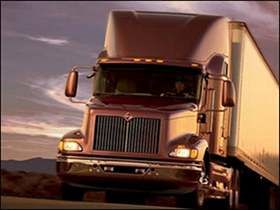Debit/credit Card Use On The Road?
Topic 10683 | Page 1
That's right Hiram.
I use mine everywhere. You just call your bank and they will put your card into a "travel" designation which will allow you to use it freely wherever you go. They will usually limit how long that travel designation lasts, but they will tell you so that you will know to renew that designation when it comes time.

Tangential question: Is personal funds used only for personal purchases, or are drivers responsible for fueling, tolls, etc. as well? Would that be based on a company's individual policies or is it an industry-wide standard?

That's right Hiram.
I use mine everywhere. You just call your bank and they will put your card into a "travel" designation which will allow you to use it freely wherever you go. They will usually limit how long that travel designation lasts, but they will tell you so that you will know to renew that designation when it comes time.
Thanks for the response Old School! I know that with that benefit comes the high risk of someone stealing ones identity, since the bank will not be able to discern between my card use or someone else using my info to make online purchases. Have you had any problems with that?

I ask this because the only cross country driving I've been exposed to was when I toured with musicians. Tour bus drivers are given a "float" of cash funds for things like tolls, gas, oil changes, bus washes, etc. I was curious if there is a similar process with trucking.

Tangential question: Is personal funds used only for personal purchases, or are drivers responsible for fueling, tolls, etc. as well? Would that be based on a company's individual policies or is it an industry-wide standard?
Well, I have read in the blogs of this website that normally you do not have to use your own money for company expenses. Also read that in case of emergency company related expenses, to keep the receipts and it might be reimbursed to you.

Cool beans. Thanks!

Cool beans. Thanks!
You will likely be given a Comdata card (or similar card) that will serve as your fuel card. Fuel stops are usually planned in advance and authorized at a specific stop. Your Comdata card will be actived for the specific fueling location (like; Loves, T/A, Pilot, etc.).

I didn't think they would expect a driver to foot the fuel bills, but then again I didn't want to assume. Thanks for the info!
I didn't think they would expect a driver to foot the fuel bills, but then again I didn't want to assume. Thanks for the info!
I have Swift experience, but it should hold for the rest. You get one debit card - ComData. It works for TWO accounts: It pays for fuel for your company. YOU use the same card at a store register, it's YOUR debit card for your ComData funds. (weird if you're not used to this, but that's how it goes.)
I bought some running lights once, using my ComData card. I think Swift paid through their side of the account. At any rate, yo submit your receipts with your load bills, and it will be re-deposited into your ComData account. Same for tolls and such. When in doubt, send in the receipt and hope for the best.
Also, it's available on the ComData web site you can get the usual "bank statement" for your account.
BMI:
Body mass index (BMI)
BMI is a formula that uses weight and height to estimate body fat. For most people, BMI provides a reasonable estimate of body fat. The BMI's biggest weakness is that it doesn't consider individual factors such as bone or muscle mass. BMI may:
- Underestimate body fat for older adults or other people with low muscle mass
- Overestimate body fat for people who are very muscular and physically fit
It's quite common, especially for men, to fall into the "overweight" category if you happen to be stronger than average. If you're pretty strong but in good shape then pay no attention.
New Reply:
New! Check out our help videos for a better understanding of our forum features

















Preview:








 TT On Facebook
TT On Facebook
I am about to start working over-the-road soon and was wondering how other drivers deal with the use of debit and credit cards authorizations while over the road. I guess I will have to call my bank and explain that I will be an over the road trucker...?
Over The Road:
Over The Road
OTR driving normally means you'll be hauling freight to various customers throughout your company's hauling region. It often entails being gone from home for two to three weeks at a time.